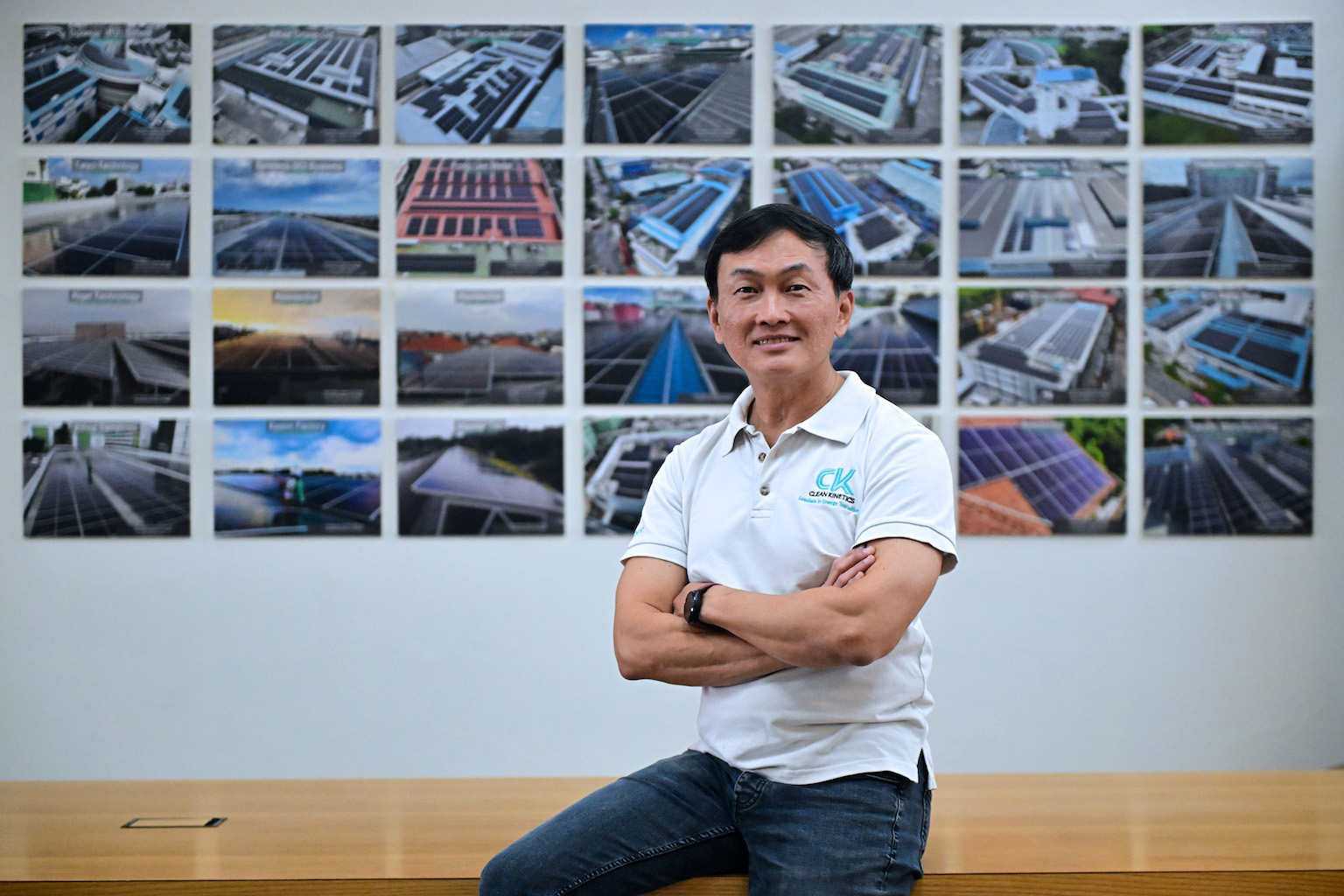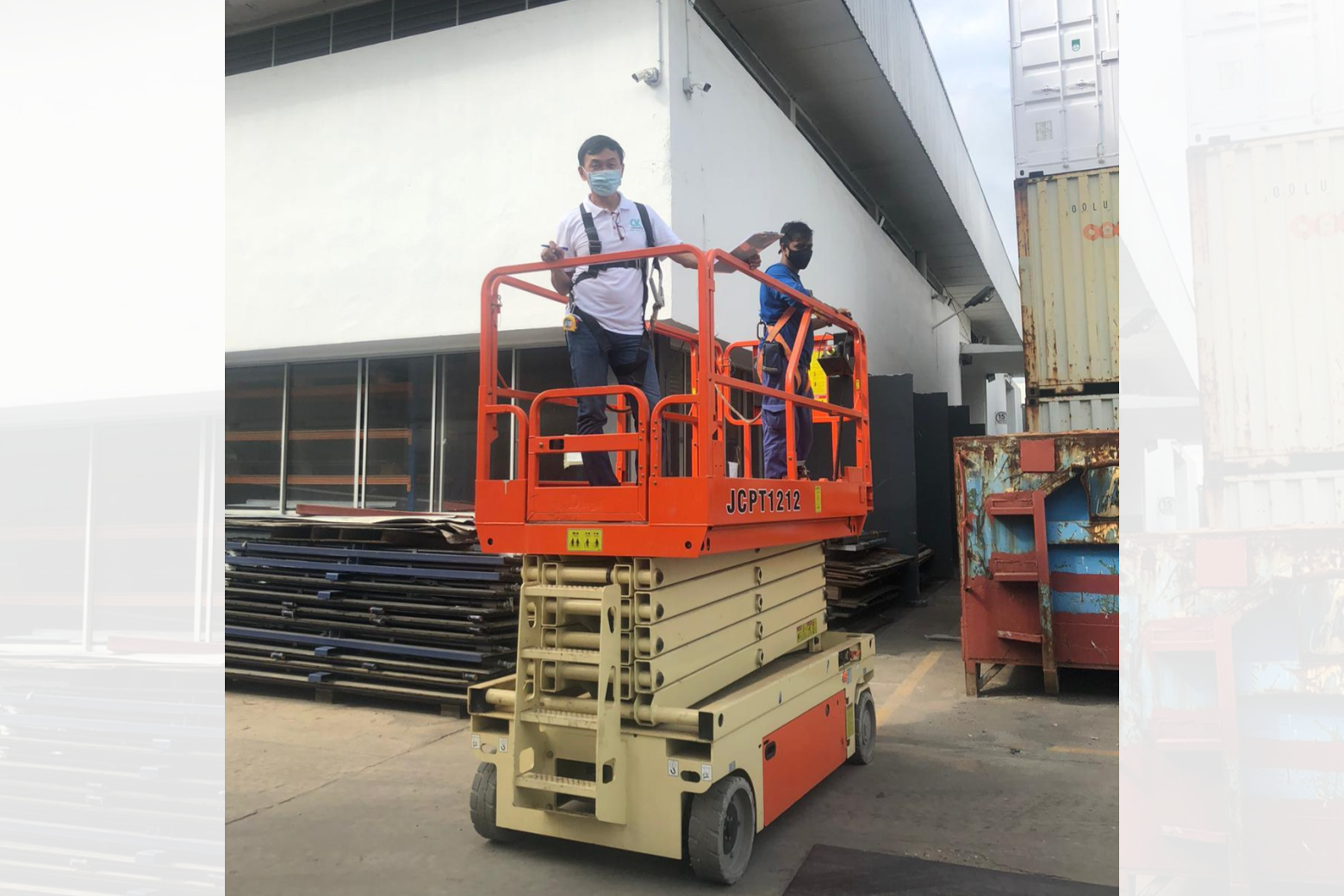BRANDED CONTENT
From corporate career to clean energy: A 58-year-old’s quest for a lasting legacy
How the former army regular and corporate leader built a solar solutions company without any prior expertise

Clean Kinetics co-founder Lee Kah Lup shares how his various overseas postings and network formed in his previous career were key in growing his new venture.
PHOTO: THARM SOOK WAI
Nicholas Yong, Content STudio
Follow topic:
Sweat trickled down his sunburnt face as Mr Lee Kah Lup hoisted another solar panel onto the scorching rooftop. It was 2021, and the 55-year-old had traded boardrooms for building sites.
“It was really tough, especially with the afternoon sun,” says Mr Lee. “We couldn’t even have our lunch because we had no appetite, it was just so hot.”
Just months earlier, Mr Lee’s 24-year career at Singapore Technologies Engineering had ended abruptly. The vice-president of marketing accepted an offer of early retirement due to the Covid-19 pandemic.
But it wasn’t a time for him to relax. “It was time to make a transition, not driven so much for money or profit,” says Mr Lee, 58. “There was more I could do.”
This was the unconventional start of the next chapter of his life – and the birth of Clean Kinetics, a solar engineering, procurement and construction company which made $10 million in sales last year.
What led to the new venture in renewable energy? Purpose and opportunity, he shares.
“Every day, everybody is talking about global warming, environmental changes, carbon dioxide and greenhouse gas emissions, so it made sense for us to enter the renewable energy space,” says Mr Lee, who co-founded the company in July 2021, with business partner Wilson Lee, 43.
They assessed that solar was the most viable of the renewable energy options, and a business opportunity thanks to the Singapore Green Plan 2030.
Initiated by the Government in 2021, the Singapore Green Plan is a set of goals and targets to chart a more sustainable future for the country. It includes increasing the country’s solar capacity to at least 2 gigawatt-peak (GWp) by 2030, which now stands at 1.2GWp.
“I’m almost at the last lap of my run (in life),” says the father of four. “Let's build and leave something behind that our children can be proud of.”
Starting from scratch
Before starting Clean Kinetics, the partners were new to sustainable energy. Eager to learn, they approached local solar panel installation companies to take on manual labour roles.
“We begged all these people to give us a hands-on role,” says the former Singapore Armed Forces Major. “We had no experience, no tools, and didn’t know the design considerations for a solar PV (photovoltaic) system. We didn’t know anything.

“So the early days was Wilson and I carrying whatever needs to be carried up to the roof, following instructions and installing it. That’s how we got started. We learnt everything from scratch.”
The breakthrough came after six months. Clean Kinetics was approached by real estate agency ERA with a $260,000 project to install solar panels at its headquarters in Toa Payoh.
Few dared to tackle the project due to technical and logistical challenges.
Custom-designed mounting structures were needed to install solar panels above water tanks, pumps and HVAC (heating, ventilation, air-conditioning) units. There was also a short three-month timeframe, and a lack of ground clearance to use cranes for hoisting operations.
“Our guys had to carry all the materials including 100kg concrete ballasts up six floors,” recalls Mr Lee, adding that they had to hire 20 contract workers to take on a project over the Lunar New Year. “But we were willing to take it on because we were hungry.”
It proved pivotal. The company went on to secure 30 more projects within the year. “We could start aggressively marketing our capabilities, recruit engineers and technicians, and buy specialised equipment and tools.
“We were more confident that we could design, install, test, commission and maintain solar plants in Singapore.”
Shining success
After an initial $100,000 investment from the co-founders, Clean Kinetics has been profitable for the past three years, making over $20 million since 2021.
It now has a head count of about 70 in Singapore, consisting of design engineers, supervisors and workers. Clean Kinetics has completed some 80 projects, with clients including car distributor Tan Chong Motors and the Land Transport Authority.
One of its largest ongoing projects is a contract with the Housing Development Board to install solar panels across 49 schools by 2025.
To date, it has installed more than 90,000 solar panels, which generate 63GWh of green energy annually – enough to power 14,900 four-room Housing Board flats for a year.
Clean Kinetics also installs electric vehicle (EV) chargers at the premises of its clients, which are powered by the electricity generated by its solar panels.
“Many of these factories are converting their fleet to EV. So whatever is generated from the sun powers their vehicles, making it totally green.”
Catalyst for change
Meaning over money: Was it worth $120,000 a year to keep a community initiative going? Founder of the Repair Kopitiam believes in a higher purpose besides maximising profits.
Better access for a better planet: What prevents consumers from switching to sustainable products? A lack of options, not price, says this social entrepreneur. Here’s how his retail space in Funan is connecting shoppers with small brands.
Toss bad habits, not food: Troubled by growing food wastage in Singapore, this local entrepreneur shifts focus from the family’s food business to start the Republic’s first food bank.
Rays of opportunity
Clean Kinetics is also making headway abroad. After multiple projects across South-east Asia, the Middle East represents its next great frontier – leveraging connections formed in Mr Lee’s previous career.
Last month, it completed a 417MWp project in Doha, Qatar, which involved the installation of over 700,000 solar panels.
On Monday (July 8), the company signed a memorandum of understanding with the Al-Hussein Technical University in Amman, Jordan to develop programmes in renewable energy and sustainability engineering for its students. Graduates will also have job opportunities at Clean Kinetics’ Middle East offices.
He shares that Clean Kinetics is also coming full circle, as it looks into recycling used and damaged solar panels from different projects.
“You can break down the components of the panels back into the elements so everything can be recycled, and we can offer complete end-to-end solutions.”
Bright spot abroad
With Singapore’s land constraints, Mr Lee says that internationalisation was “always part of the plan, right from the start”.
In 2022, Clean Kinetics began expanding overseas, with projects across South-east Asia, and in Qatar and Jordan. It is also opening an office in the Saudi capital Riyadh later this year.
Over 80 per cent of businesses across Asean and Greater China are, too, interested in overseas expansion, notes UOB’s Business Outlook Study 2024. Yet 39 per cent cite difficulty in finding the right partners to work with as a key challenge.
Conducted between December and January, it surveyed over 4,000 business owners and executives from small to large enterprises in seven regional markets.
What else do businesses say about expanding abroad? Key insights from the study include:
- 62%
Say improving profitability is a key motivator to expand overseas, in addition to growing revenue (56%) and building an international reputation (50%)
- Indonesia
Is the top market that businesses are keen to expand to, followed by Vietnam. Top sectors include manufacturing, engineering, technology, media and telecommunications
- Over 1 in 3
Lack in-house talent or adequate funds to drive expansion. The same proportion says that support measures, such as the availability of funding grants and connections to large corporations, will aid their expansion goals
“With our strong presence in eight out of 10 Asean markets, we understand the complexities that small and medium-sized enterprises across the region face in doing business,” says Ms Kavita Bedi, head of Group Business Banking, UOB.
To help, she adds how the bank connects businesses to the right partners with its extensive network and industry expertise, and digital platform capabilities that provide relevant insights and solutions to enter new markets.
“We remain committed to partnering businesses to build resilience and seize new growth opportunities.”
Building a Sustainable Asean is a series sharing insights on how individuals and businesses can take action to forge a cleaner, greener tomorrow.
This is the third of a five-part series in partnership with


